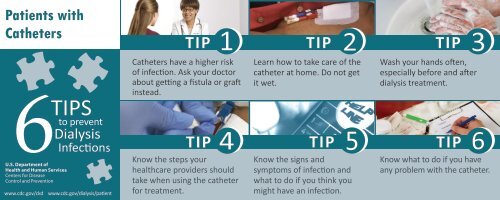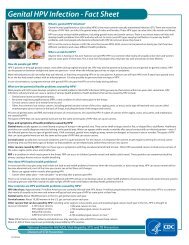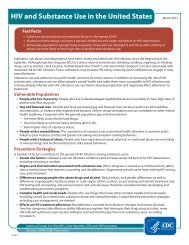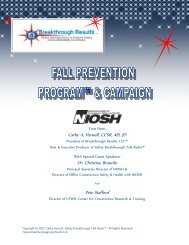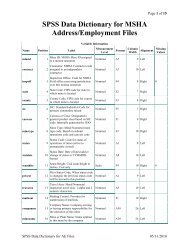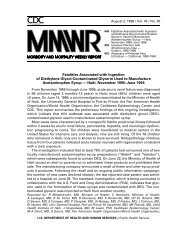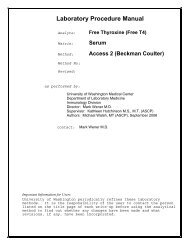Patient Pocket Guide
Patient Pocket Guide
Patient Pocket Guide
Create successful ePaper yourself
Turn your PDF publications into a flip-book with our unique Google optimized e-Paper software.
<strong>Patient</strong>s with<br />
Catheters<br />
Catheters have a higher risk<br />
of infection. Ask your doctor<br />
about getting a fistula or graft<br />
instead.<br />
Learn how to take care of the<br />
catheter at home. Do not get<br />
it wet.<br />
Wash your hands often,<br />
especially before and after<br />
dialysis treatment.<br />
www.cdc.gov/ckd www.cdc.gov/dialysis/patient<br />
Know the steps your<br />
healthcare providers should<br />
take when using the catheter<br />
for treatment.<br />
Know the signs and<br />
symptoms of infection and<br />
what to do if you think you<br />
might have an infection.<br />
Know what to do if you have<br />
any problem with the catheter.
<strong>Patient</strong>s with<br />
Fistulas or Grafts<br />
Take care of your dialysis<br />
access site at home. Avoid<br />
scratching or picking it.<br />
TIP TIP TIP<br />
Wash your hands often,<br />
especially before and after<br />
dialysis treatment.<br />
Wash or cleanse your dialysis<br />
access site prior to treatment.<br />
www.cdc.gov/ckd<br />
www.cdc.gov/dialysis/patient<br />
TIP<br />
Know the steps your<br />
healthcare providers should<br />
take when using your dialysis<br />
access for treatment.<br />
TIP<br />
Know the signs and<br />
symptoms of infection and<br />
what to do if you think you<br />
might have an infection.<br />
TIP<br />
Know what to do if you have<br />
any problem with your dialysis<br />
access site.


